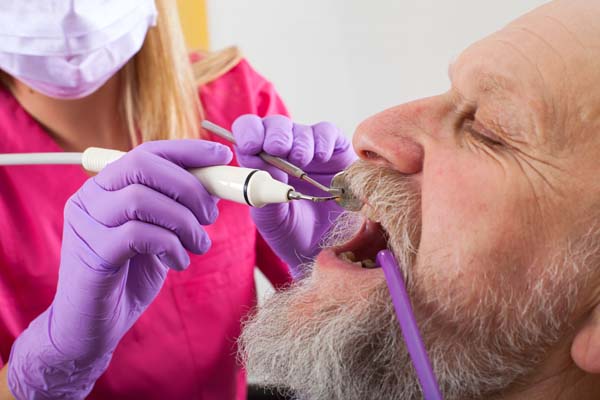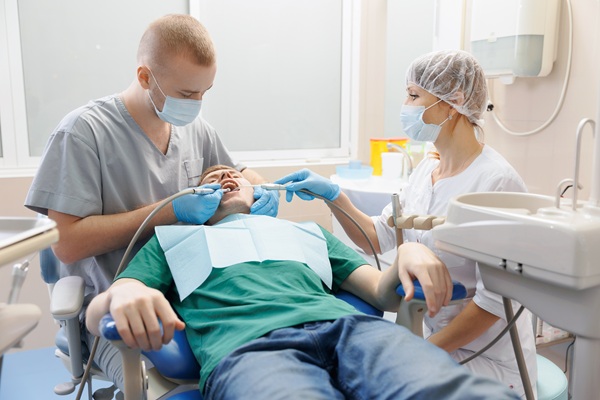Oral Pathology: Preventing Oral Cancer

There is a branch of specialized dentistry concerned with preventing and treating cancer of the mouth that is called oral pathology. This practice includes the management of patients and researching, diagnosing, studying, and treating disorders of the mouth and jaw. Oral cancer is increasing slightly while the new cases of oral cancer resulting from human papillomavirus are rising.
Oral cancer can appear on your lips, cheek lining, gums, tongue, on the floor of your mouth, and the roof of your mouth. It could even appear in your throat. If your periodontist finds something suspicious that may be oral cancer, stay calm. You could have something that needs to heal on its own, and you will not know anything for sure until you have some tests run.
The symptoms of oral cancer
If you have oral cancer, there are certain signs you would likely exhibit. Some of them could be:
- Pain, tenderness, or numbness in your mouth or lips
- Red or white patches
- Soreness or irritation that doesn’t go away
- A rough spot, lump, thickening, crust, or small eroded area
You might also find speaking, chewing, swallowing, or moving your tongue or jaw to become difficult or even a difference in the way your teeth fit together. You could experience a sore throat or feeling like something is caught in your throat, or even a change in your voice. If you experience any of these symptoms, it does not necessarily mean you have oral cancer, but it would be a reason to speak with your periodontist or an oral pathologist.
How your periodontist can help detect oral cancer early
Your periodontist knows oral pathology, and even though they cannot tell for sure if you have cancer, they can examine to check for any signs. Your periodontist should be especially concerned if your symptoms have persisted for two weeks or more. During the examination, your periodontist will want to know about changes in your medical history and whether you have been experiencing any unusual symptoms.
Then your periodontist will check throughout your oral cavity. This check includes your lips and throughout the inside of your mouth. The periodontist will also check the soft part of the roof of your mouth, your throat, and your tonsils.
What you can do to prevent oral cancer
It is essential to be aware of your risk factors, including the fact that men are twice as likely to get oral cancer as they get older. If you smoke, drink excessive amounts of alcohol, or have a poor diet, you will want to eliminate these habits because that will increase your chances of developing oral cancer.
One of the main concerns of oral pathology is whether you have had oral cancer in the past. Suppose you have developed habits that put you at risk for oral cancer or had oral cancer in the past. In that case, you will want to keep up with regular dental visits and let your periodontist know right away if you are experiencing any of the symptoms mentioned earlier.
Request an appointment here: https://brighton.drjstearns.com or call Platte Valley Oral Surgery at (303) 997-0223 for an appointment in our Brighton office.
Check out what others are saying about our services on Yelp: Read our Yelp reviews.
Recent Posts
Undergoing oral surgery can feel overwhelming, but proper post-operative care is crucial to ensure a smooth recovery. Whether you have had wisdom teeth removed, dental implants placed, or another procedure, following the right recovery steps can help minimize discomfort and prevent complications.First and foremost, the oral surgeon will provide detailed post-operative care instructions specific to…
Bone grafting is a surgical procedure that is done to rebuild bone loss or repair bone damage in the oral cavity. When a tooth is lost or removed from its socket, the alveolar bone supporting it starts to deteriorate, resulting in a gradual collapse of facial features. If this happens, a patient who opts for…
The TMJ, or the temporomandibular joint, connects the skull and lower jaw and is located by the ear. The joint functions like a hinge, enabling the jaw's movement for opening, closing, smiling, eating, and other mouth activities. If the jaw joint feels painful and is unable to perform its function, the cause could be what…
A jaw surgery can bring back your smile and dental function. This procedure can restore your self-esteem. It can even open doors for new opportunities in your personal and professional life. Knowing more about this procedure can help you prepare for it. Here are the details on how jaw surgery can help bring back your…


